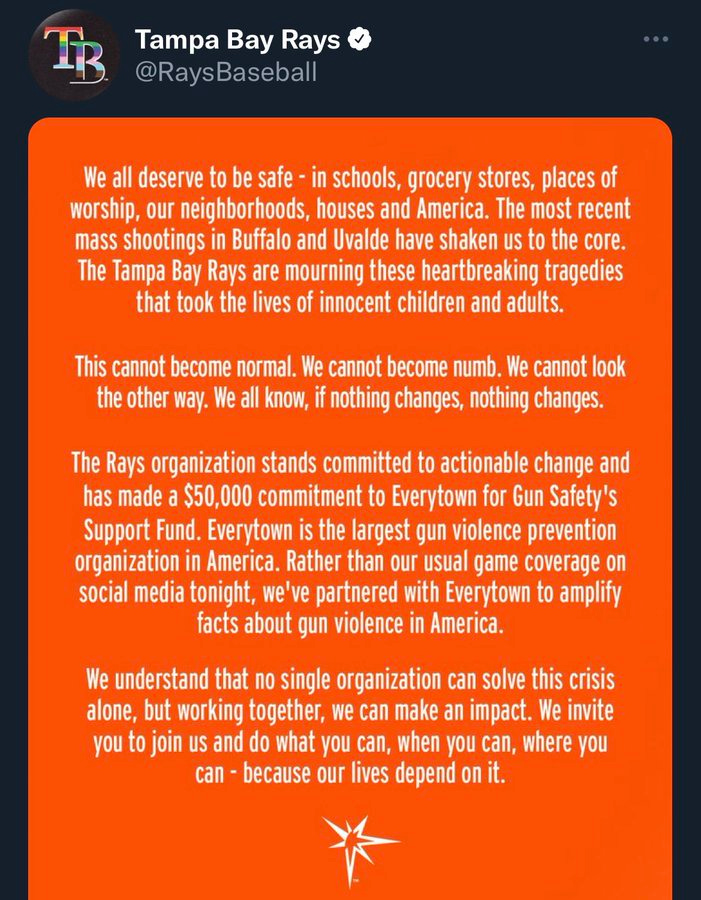Too Much TV: Your TV Talking Points For Friday, June 3rd, 2022
Is coverage of the January 6th hearing inherently political?
Here's everything you need to know about the world of television for Friday, June 3rd, 2022.
HOW WILL STREAMERS HANDLE NEXT THURSDAY'S PRIMETIME JANUARY 6TH HEARING?
Next Thursday, the House select committee investigating the January 6th insurrection of the US Capitol will have its first public hearing and it will be in primetime. I spent some time today trying to determine how the various networks, cable news channels and streamers were planning on covering the event and I spoke on background to someone at one of the streamers who told me there were ongoing internal discussions about how much their live stream coverage should be promoted across the service. Some of the news executives were arguing the coverage should be the first thing subscribers see when they log-in to the home page on Thursday. But apparently, some on the more corporate side of the discussion worried that promoting the coverage - even though it is seen as legitimate news - would be seen by some as taking a side and/or being political.
Now on one level, this seems like a broad overreaction. What does it matter if a few people are unhappy with coverage of the January 6th hearing?
But looking out wider, the events of the past couple of days in Florida have shown that actions that in any other context would be seen as mild have become cultural rallying points and reasons to punish companies.
On Thursday, Florida Governor Ron DeSantis vetoed a $35 million funding bill targeted for a potential spring training site for the Tampa Bay Rays baseball team after they shared this message on social media:
And on Friday, the Special Olympics announced they would wave their mask mandate for their upcoming event in Orlando after Governor DeSantis threatened to impose $27.5 million in fines over the requirement.
So given all of this, I suppose worrying about the political blowback over hearing coverage isn't insane. But it's also worth noting that these companies (and other like them in other states) were being threatened with punishment for even the perception of crossing the wishes of the state government.
And that attitude doesn't respect logic or goodwill. As a major media company, you can't keep a low enough profile to stay off of their radar. The legislative mob will come for you and the smartest move is to do what is best for your customers and your company. If pushback comes (and it almost certainly will), you can then figure out the best way to respond. Fear and timidity only makes the downside more inevitable because bullies can sense fear.
ADVERTISERS NEED NETFLIX AS MUCH AS IT NEEDS ADVERTISERS
There have been what seem to be dozens of hot take pieces about Netflix's apparent decision to add some sort of an ad-supported version of the service and nearly every piece has focused on Netflix's motivations for making the decision. The company is weakening, it's finally coming around to what nearly every other streamer is trying, etc. But this post by Mike Shields is the first one I've seen that looks at the decision from the other direction. While adding an ad-supported tier might be a good move for Netflix, it's even more important for advertisers, who are facing a critical shortage of quality places to run their ads:
Even as the big media companies were cheering the recent news that HBO and Disney and finally Netflix were all opening up ad tiers – advertising can’t be stopped! - it doesn’t change the fact that a massive amount of TV ad space is set to evaporate, and isn’t getting replaced by CTV. At least not on a one to one level.
Why so negative? Well there’s the simple fact of math. Historically linear TV has averaged 20 something minutes of TV ad time per hour, or far worse in the land of basic cable. The first thing that any of these new players – Peacock, HBO, Disney, etc – will tell you is they barely have any breaks. If one service says it only has five minutes of ads per hour, well, the others are going to four, or maybe less. That means for every linear viewing hour that shifts to CTV, 15-plus minutes are gone. You can’t shove a $70 billion of TV ad into a container that only holds a quarter of what the previous one did, no matter how much you raise prices.
He also addresses the AVOD market and aside from all of the problems with fraud and other technical issues that plague the industry, Shields suggests that what data that is available about the average AVOD viewer suggests they have a lower income than SVOD customers:
Now we are not talking about a completely representative slice of the market here, but directionally this is super intriguing. Are the people that cut the cord for antennas simply younger folks who’ve never graduated to pay TV? (actually, they’re older, per Nielsen). Do they live in places where its hard to get cable? Or are they – whispers – lower income folks? Well, Nielsen found that “just under 70% of [this] audience says they spend less than $100 each month for their TV programming.”
So does that mean that the audience for free ad-supported CTV services skews heavily toward lower income demos?
Hey, there’s nothing wrong with lower income consumers (just ask Trump) – but they are not the kind of folks that brands like Peloton or Burberry or Mercedes want to reach on TV. Even as advertising is becoming more ubiquitous, upscale households can still do more to avoid it than much of the country.
Where that leaves us is that TV as an ad medium likely won’t be able to do what it’s always been built to do – reach everybody in big bursts -even with the massive growth of CTV. That is, unless Netflix can change things.
As is almost always the case, the industry conventional wisdom take on nearly any issue misses a lot of the nuance and Shields does a nice job in this piece of filling in some of the blanks in the "Netflix is adding advertising" story.
DO WE HAVE AN ACCURATE WAY TO JUDGE THE SUCCESS OF INTERNATIONAL PRODUCTIONS OUTSIDE THE U.S.?
I'll open by saying that I don't know the answer to this question. The metrics for markets in regions such as the Middle East, Africa and parts of Asia are almost impossible to find and the more I look, the more I have the sense that I am missing a big part of the picture. I just don't know what that might be.
I bring this up because the Entertainment Strategy Guy's latest Substack piece discusses foreign-produced films and he argues that most of them are pretty bad:
For example, last week, 365 Days: This Day (a Polish sequel to an erotic thriller, with tons of sex) made the Nielsen charts. (Though it fell off this week.) While popular, it has horrendously bad IMDb scores, likely due to the graphic content. But last week the South African film Silverton Siege also made the Nielsen charts with 2.0 million hours viewed. (It also fell off this week.) It has an okay 6.0 IMDb score on a low-ish 1,400 reviews.
Some other Netflix foreign films have decent IMDb scores too. For example, the anime title, Bubble—by the creators of Attack on Titan, if you know anime—has a 6.4 on 3.3K reviews on IMDb. (Side note: Netflix released both The Bubble, directed by Judd Apatow, and Bubble in the same month. Not good planning there…) The Indian film, Gangubai Kathiawadi—a theatrical title Netflix is distributing globally—has a 7 on IMDb with a 42K. The Getaway King, a Polish title, has a 6.6 on 1,400 reviews. See? Not as bad.
He and I have went back-and-forth about this and I don't think either one of us are going to change our minds. Especially since he's basing his arguments on the data he has at hand.
But I don't think IMDb ratings are an accurate reflection of quality and/or value to the streamer when it comes to foreign-produced films. If a movie is relatively cheap and does well in its home markets - for instance a South African movie like Silverton Siege - isn't that enough, even if the American/UK/Australia nexus of viewers don't respond to it? I'd argue yes and based on a lot of anecdotal data I've gathered, that seems be happening in some cases. But I don't have the hard data to prove my point and it's a bit frustrating.
IN THE 'DAMNED IF YOU DO, DAMNED IF YOU DON'T DEPARTMENT
Apparently all you need to sell a piece on Netflix is make some novel argument about why they're screwed. This Shirley Li piece in Atlantic argues that the success of Stranger Things (and its big budget for season four) is an indication of the fragileness of Netflix's business model:
The success of Season 4, in other words, is only further proof of Netflix’s unsustainability. A $30-million-an-episode budget is unlikely to be replicated for other projects in the company’s pipeline. Not every show can afford to be turned into event viewing. And as with previous headline-making statistics the streamer has released, the figures touted this week come with a heap of salt: Stranger Things last aired in 2019, and since then, Netflix has changed its model of determining ratings, making it impossible to accurately compare the success of this season with that of previous ones. (The third season also broke records, for instance, but viewership at the time was tallied according to the number of households watching at least 70 percent of an episode, not the number of total hours streamed.) So yes, 286.79 million hours is indeed a record-breaking number—but only in terms of data the company began collecting last year. And even then, the show’s achievements seem paltry when non-English-language series are added into the mix. In its best-performing week, the Korean drama Squid Game accumulated more than 571 million hours viewed, eclipsing Stranger Things’ total.
ODDS AND SODS
* Chernobyl: The Lost Tapes premieres Wednesday, June 22nd on HBO.
* HBO Max has canceled Raised By Wolves.
WHAT'S NEW FOR FRIDAY
Here's a quick rundown of all the new stuff premiering today on TV and streaming:
American Masters: Joe Papp In Five Acts (PBS)
Fire Island (Hulu)
Floor Is Lava Season Two Premiere (Netflix)
Guy's All-American Road Trip Series Premiere (Food)
Hollywood Stargirl (Disney+)
Interceptor (Netflix)
Physical Season Two Premiere (Apple TV+)
P-Valley Season Premiere (Showtime)
The Boys Season Three Premiere (Amazon)
The Villains Of Valley View Series Premiere (Disney)
Trixie Motel Series Premiere (Discovery+)
Ultra Violet & Black Scorpion Series Premiere (Disney)
White Elephant (AMC+)
Click Here to see the list of all of the upcoming premiere dates for the next few months.
SEE YOU MONDAY!
If you have any feedback, send it along to Rick@AllYourScreens.com and follow me on Twitter @aysrick.




